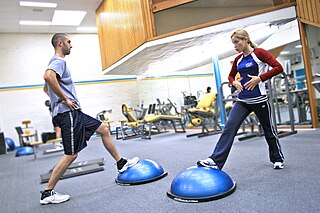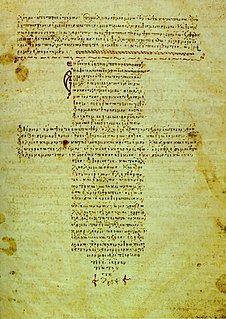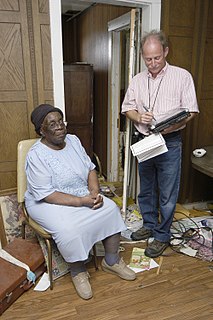Related Research Articles

A personal trainer is an individual who has earned a certification that demonstrates they have achieved a level of competency for creating and delivering safe and effective exercise programs for apparently healthy individuals and groups or those with medical clearance to exercise. They motivate clients by collaborating to set goals, providing meaningful feedback, and by being a reliable source for accountability. Trainers also conduct a variety of assessments beginning with a preparticipation health-screening and may also include assessments of posture and movement, flexibility, balance, core function, cardiorespiratory fitness, muscular fitness, body composition, and skill-related parameters to observe and gather relevant information needed to develop an effective exercise program and support client goal attainment. These assessments may be performed at the beginning of and after an exercise program to measure client progress toward improved physical fitness. They also provide education on many other aspects of wellness, including general health and nutrition guidelines. Helping clients to reach their full potential in various aspects of life requires a comprehensive client-centered approach along with a belief that clients are resourceful and capable of change.

Certified Public Accountant (CPA) is the title of qualified accountants in numerous countries in the English-speaking world. It is generally equivalent to the title of chartered accountant in other English-speaking countries. In the United States, the CPA is a license to provide accounting services to the public. It is awarded by each of the 50 states for practice in that state. Additionally, almost every state has passed mobility laws to allow CPAs from other states to practice in their state. State licensing requirements vary, but the minimum standard requirements include passing the Uniform Certified Public Accountant Examination, 150 semester units of college education, and one year of accounting related experience.

An arborist, tree surgeon, or arboriculturist, is a professional in the practice of arboriculture, which is the cultivation, management, and study of individual trees, shrubs, vines, and other perennial woody plants in dendrology and horticulture.
Software engineering professionalism is a movement to make software engineering a profession, with aspects such as degree and certification programs, professional associations, professional ethics, and government licensing. The field is a licensed discipline in Texas in the United States, Engineers Australia(Course Accreditation since 2001, not Licensing), and many provinces in Canada.

Professional ethics encompass the personal and corporate standards of behavior expected by professionals.
The Certified Financial Planner (CFP) designation is a professional certification mark for financial planners conferred by the Certified Financial Planner Board of Standards in the United States, and by 25 other organizations affiliated with Financial Planning Standards Board (FPSB), the owner of the CFP mark outside of the United States. The certification is not a government designation, nor an accredited degree, and is owned by the for profit Kaplan Corporation in the United States.
A Marine surveyor is a person who conducts inspections, surveys or examinations of marine vessels to assess, monitor and report on their condition and the products on them, as well as inspects damage caused to both vessels and cargo. Marine surveyors also inspect equipment intended for new or existing vessels to ensure compliance with various standards or specifications. Marine surveys typically include the structure, machinery and equipment and general condition of a vessel and/or cargo. It also includes judging materials on board and their condition. Because certifications and subsequently payments are processed only after the surveyor has expressed his or her satisfaction, a marine surveyor holds a prestigious position and is held with much regard in the shipbuilding industry. Marine Surveyors are highly qualified and technically sound and are usually selected after thorough evaluation procedures as vessels ranging from small ferries to enormous crude oil carriers and cruise liners are approved to sail into the high seas based purely on their judgment, competence and integrity.
Engineering ethics is the field of system of moral principles that apply to the practice of engineering. The field examines and sets the obligations by engineers to society, to their clients, and to the profession. As a scholarly discipline, it is closely related to subjects such as the philosophy of science, the philosophy of engineering, and the ethics of technology.

A home inspection is a limited, non-invasive examination of the condition of a home, often in connection with the sale of that home. Home inspections are usually conducted by a home inspector who has the training and certifications to perform such inspections. The inspector prepares and delivers to the client a written report of findings. The client then uses the knowledge gained to make informed decisions about their pending real estate purchase. The home inspector describes the condition of the home at the time of inspection but does not guarantee future condition, efficiency, or life expectancy of systems or components.
A personal injury lawyer is a lawyer who provides legal services to those who claim to have been injured, physically or psychologically, as a result of the negligence of another person, company, government agency or any entity. Personal injury lawyers primarily practice in the area of law known as tort law. Examples of common personal injury claims include injuries from slip and fall accidents, traffic collisions, defective products, workplace injuries and professional malpractice.
Certified Engineering Technologist is a Canadian professional title awarded on the basis of academic qualification and work experience. Abbreviated as C.E.T., most Canadian provincial engineering and applied science technology associations offer this certification. Certification is voluntary and does not represent a provincial regulatory requirement or a statutory required license.
The Yacht Safety Bureau, Inc. (YSB) was a non-profit corporation organized under the membership corporation law of the State of New York that provided safety and testing standards for the marine industry in the United States. Located in Westwood, New Jersey, the YSB developed boat safety tests, developed test equipment for these tests, and wrote standards for such testing, completely independently of commercial interests. It later became the Marine Department of Underwriters' Laboratories.
The Institute of Management Consultants USA is the professional association and the sole certifying body for individual management consultants in the United States. It awards the Certified Management Consultant (CMC) as evidence of professional consulting experience, technical competence, knowledge and skills in consulting processes, client satisfaction and adherence to rigorous ethical standards. The CMC is recognized by and accorded reciprocity in 46 countries and accredited by the International Council of Management Consulting Institutes (ICMCI).
A legal nurse consultant is a registered nurse who uses expertise as a health care provider and specialized training to consult on medical-related legal cases. Legal nurse consultants assist attorneys in reading medical records and understanding medical terminology and healthcare issues to achieve the best results for their clients. The specialty is a relatively recent one, beginning in the mid-1980s.
Certified Medical Reimbursement Specialist (CMRS) is a voluntary national credential that was created specifically for the medical billing professional. The American Medical Billing Association (AMBA) has been providing this industry certification and designation for nearly a decade.
The Certified Professional Organizer (CPO) designation is an experience and exam-based certification for professionals who have met specific minimum standards, and proven through examination and client interaction that they possess the requisite body of knowledge and experience.
Engineering law refers to the application of laws applying to the practice of professional engineering. Engineering law is the study of how ethics and legal frameworks are adopted to ensure public safety surrounding the practice of engineering. California law defines engineering as the professional practice of rendering service or creative work requiring education, training and experience in engineering sciences and the application of special knowledge of the mathematical, physical and engineering sciences in such professional or creative work as consultation, investigation, evaluation, planning or design of public or private utilities, structures, machines, processes, circuits, buildings, equipment or projects, and supervision of construction for the purpose of securing compliance with specifications and design for any such work. By comparison Ontario lists safeguarding of life and public welfare in its definition. Ontario law defines engineering as the act of planning, designing, composing, evaluating, advising, reporting, directing or supervising that requires the application of engineering principles and concerns the safeguarding of life, health, property, economic interests, the public welfare or the environment, or the managing of any such act.

The International Information System Security Certification Consortium, or (ISC)², is a non-profit organization which specializes in training and certifications for cybersecurity professionals. It has been described as the "world's largest IT security organization". The most widely known certification offered by (ISC)² is the Certified Information Systems Security Professional (CISSP) certification.
Clinical mental health counseling is a distinct profession with national standards for education, training, and clinical practice. Clinical mental health counselors operate from a wellness perspective, which emphasizes moving toward optimal human functioning in mind, body, and spirit, and away from distress, dysfunction, and mental illness. Counselors also view wellness and pathology as developmental in nature, and take into consideration all levels of a client's environment when conducting assessment and treatment. Counselors also frequently take a team approach, collaborating with other mental health professionals to provide the most comprehensive care possible for the client.

The National Contract Management Association (NCMA) is a professional association, based in the United States, dedicated to the profession of contract management. Founded in 1959, NCMA now has over 20,000 members and more than 100 local chapters. NCMA promotes contract management through various means, including education, networking, publications, legislative and regulatory alerts, professional certifications, a code of ethics, awards, job postings, salary surveys, and a leadership development program.
References
- NAMS-CMS Website
- Terewilliger, E.S.; "Product Safety: The Story of the Yacht Safety Bureau"' as told to Art Stout, The Boating Industry, July 1962